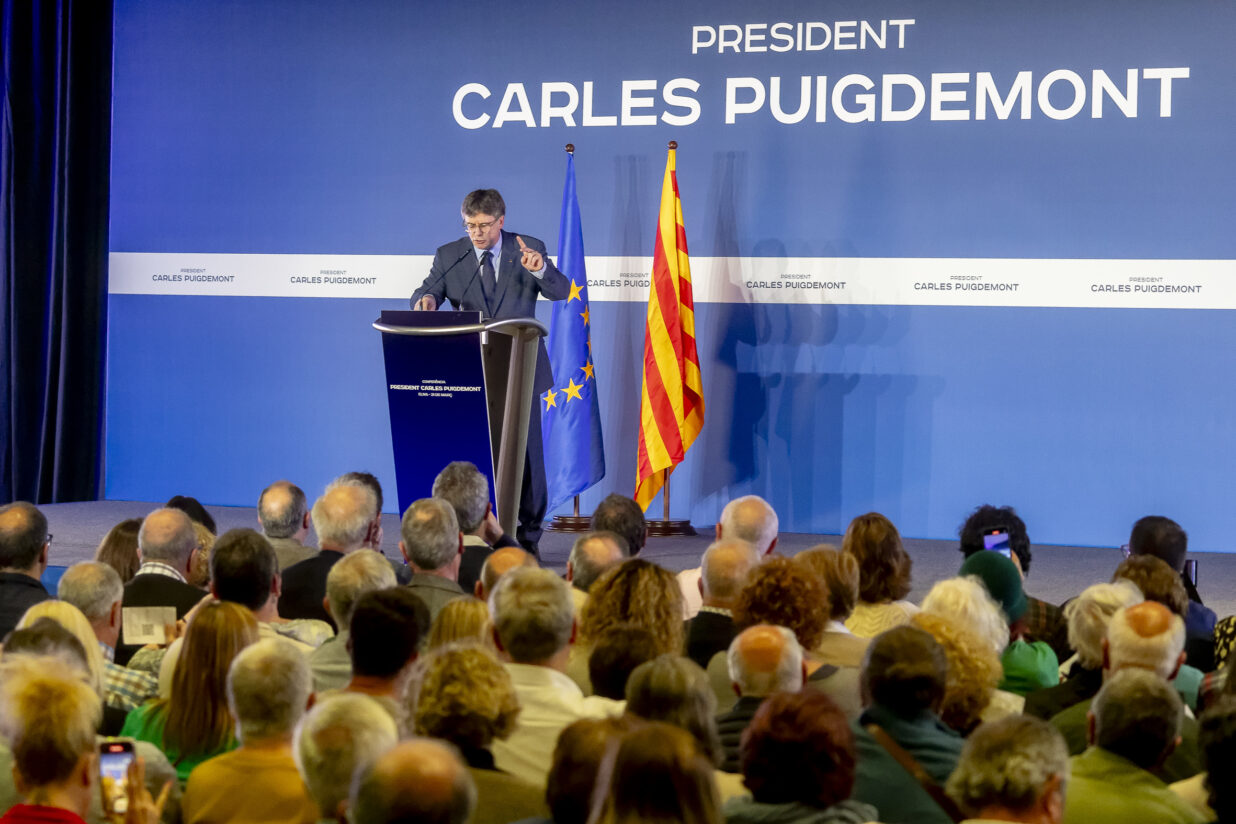22.03.2024 - 12:23
|
Actualització: 23.03.2024 - 02:32
“To bring back the president, one must vote for the president.” In 2017, Carles Puigdemont had to campaign for the post-Article 155 elections while exiled in Belgium and with many of his colleagues in prison. The pro-independence movement garnered over two million votes, but on January 30th, Puigdemont did not return and was not invested due to the “ferocious and omnivorous” repression that threatened him. Six and a half years later, with an amnesty in progress, Puigdemont has announced in Elna the date of his return: “If I am a candidate for investiture, I will definitively leave exile to attend the parliament session and seek the confidence of the chamber.”
During the press conference to announce his candidacy for the Catalan elections, echoes of that campaign could be heard, albeit without being stunned by repression this time. While back then he distanced himself from PDECat and formed Junts per Catalunya loaded with independents, today he has once again avoided the stagecraft of his party. Instead of using the Junts logo, he opted for a sober “President Carles Puigdemont” that was everywhere: at the back of the stage, on the lectern, and even on the credentials. The non-verbal communication hinted at his intentions, but he made it clear once he acknowledged that repeating a Junts pel Sí – the most engaging, mobilizing, and powerful political proposal ever, he said – is not possible: “That’s why I am clear that the candidacy I will lead must go beyond my party, Junts per Catalunya, and must incorporate profiles and support from other sectors.” All this, in front of the Junts’ top brass, who accompanied him to take the first step towards resuming the presidency taken from him in 2017.
Puigdemont has linked the reason for his exile, to preserve the institution of the presidency of the Generalitat from repression, with what has brought him here today. “Patience, perseverance, and perspective,” he asked Catalans after the proclamation of independence and before exile, and today he remembered it. Values that, he said, helped him have the necessary strength during exile to maintain his position in difficult times and have now pushed him to reject the initial idea of continuing in the European Parliament for another five years. “I couldn’t explain, not even to myself, that after spending six and a half years defending the presidency in exile, now that the opportunity arises to make its restoration possible, I would shy away from this responsibility,” he said, as a prelude to announcing his candidacy. He hadn’t said it yet, but the excitement of the audience was so high that they already interrupted him with shouts of “president.” He laughed at the unexpected, because he foresaw these shouts after the next sentence, where he framed the candidacy as a restoration of the presidency taken from him. “To resume the path that repression and division blocked, and fight with the same determination with which you have seen us fight all these years to offer our fellow citizens the quality of life and the country they deserve for the efforts they make, for the sweat of their work, for the hopes that no one can steal from them, and for the decisions they have every right to make freely,” he added.
During these years, Puigdemont has focused on the international projection of independence and has ignored daily problems, the day-to-day politics, which he has delegated to other assets of Junts. But if he wants to be president, he cannot evade it, and he has linked the idea of independence with the social and economic progress that citizens deserve. He has spoken about drought, education, healthcare, bureaucratic administration, housing, and especially fiscal plundering. Candidate Puigdemont will talk about the economy, and today he has already done so to emphasize that the best way to defend the economic interests of citizens is by confronting the Spanish state. In 2017, “the year when, according to the state, we behaved so badly that we deserved repression and punishment,” 81% of planned investments in Catalonia were executed. In contrast, he said, “while we were flattened, investment has fallen to ridiculous, insulting levels”: in 2021, 36%; in 2022, 42.9%. Investment execution figures that he compared with those of Madrid: “Let’s look at Renfe and Adif: in the last fifteen years, the difference in investment between what is spent in Madrid and what is spent in Catalonia is 153% versus 24%.”
A series of challenges, he said, demand leadership; knowing that his charisma and projection in Catalonia and the world are his main political attraction. “No matter how many resources we can dedicate to it, and no matter how many parliamentary consensuses we can articulate, without leadership we won’t get very far. If there is no leadership, the most likely thing is that people won’t follow us, tired of politics that relies entirely on the narrative.” He didn’t name names, but in the same conference where he called for unity, he didn’t hesitate to take a swipe at ERC when he saw fit. “Leading from our own project, which does not subject our institutions and policies to party strategies or the priorities of the Spanish government,” he added.
One of the arguments that other parties will launch during the campaign to discredit him will be to say that Puigdemont is a politician of the past. That he has been left behind, trapped in the confrontation of 2017, but that now it is another stage. That Catalonia has changed and that he is no longer the most suitable to lead it. He did not evade it, and to start dismantling the argument, he himself has already spoken of “today’s Catalonia” and has recalled the wounds of the pandemic; the collective dismay over the horrors of the war in Ukraine and the deaths in Israel and Palestine; the dizzying impact of technological globalization; or the effects of climate change and drought.
“Today’s Catalonia is different from that of 2017, it is true,” he said, also because of the “dismay, demobilization, and loss of confidence” on the part of citizens who were disappointed by the political incapacity to achieve independence. “The frustration because we left the job unfinished and because in all these years we have not been able to correct the disunity and internal confrontation has led to fragmentation and mistrust,” he said, which in turn has translated into abstention or voting for the lesser evil. But, in opposition to all this, he put on the leader’s hat to encourage the troops and claimed that, despite all the repression, the independence movement has remained alive and has known how to seize the opportunity when Pedro Sánchez found himself cornered by necessity.
“We have the duty to attempt to agree on a referendum for self-determination, which has always been the first option. And if we propose it, it’s because it’s as possible as amnesty was,” he said. He argued that the Spanish state recognizes the right to self-determination from 1977 onwards thanks to the international pact of civil and political rights, “incorporated into domestic law because that’s what its constitution dictates.” Now, if, as always, the Spanish government refuses, what then? A key date: October 1st, 2027. “In the next Catalan legislature, the first ten years of the referendum for self-determination and independence will occur. If the negotiation route yields no results and extends fruitlessly, we cannot renounce, in any way, achieving full independence if that’s the will of the Catalan people.”
What does this translate into? We don’t know; he hasn’t revealed it to us. But he did say: “Now that we know the routes, strengths, and weaknesses much better, it would be unacceptable if we didn’t prepare much better.” Therefore, he has advanced that he will formally propose to the Spanish government to hold a negotiated referendum for independence, but at the same time, the entire institutional and civil independence movement will work “to finish the job we started and left pending since October of that year,” if the blockade by the Spanish state persists, but also if there is still a social majority in favor of the right to self-determination.
“It should not be the work of anyone in particular or of any specific party, but of all of us together, in which we all have a specific responsibility,” he said. His responsibility is to regain the presidency after maintaining institutionalism in exile. “I have always believed that the return from exile of the presidency institution cannot be done in secret, nor should it be a provocative stunt, nor, of course, the result of surrender or personal whim. It cannot be opportunistic. Nor should it be an act in service of a specific party or organization to gain electoral benefits,” he added. When he returns, it will be to present himself for investiture, he has committed. Even if the current arrest warrant has not been lifted: “It is assumed that the judges will have applied the provisions provided for in the amnesty law, but if they adopt a rebellious and insubordinate attitude and refuse to comply with the law, I will still attend the parliamentary session if I have the majority to be invested.”
To be invested and return to Catalonia as president, votes are needed, and Puigdemont has started the pre-election campaign today in Elna: “We will need a lot of mobilization, starting with mobilization at the ballot box. Let’s not leave any ballot at home; let’s try to concentrate forces and gather a political and social majority that, like in the best occasions of our history, can overturn predictions and surprise the naysayers.”



